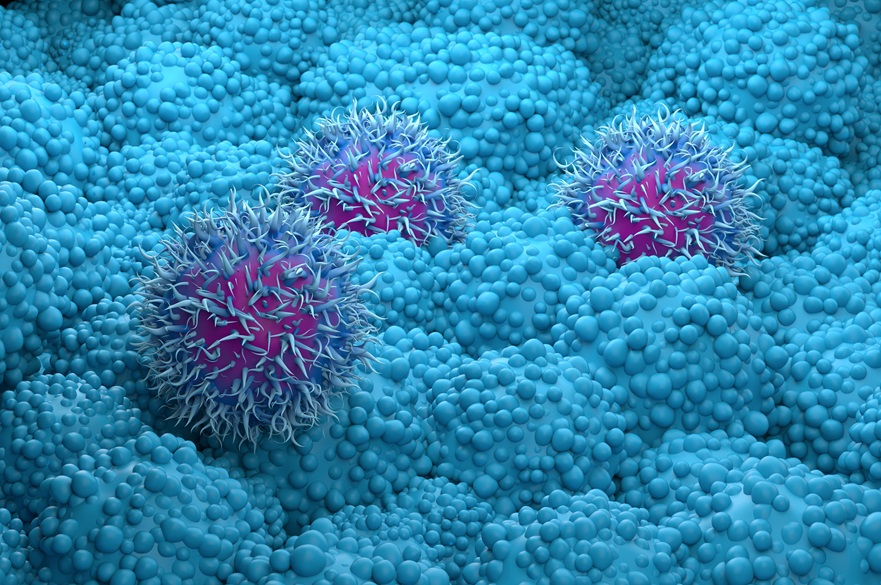Gene ‘switched off’ in early stages of pancreatic cancer, allowing rapid tumour growth and spread
A new study has revealed that a gene which works to slow the growth and spread of pancreatic cancer is ‘switched off’ by the disease, allowing it to become more aggressive.
By Dave Rogers | Published on 15 July 2024
Categories: Press office; Research; School of Science and Technology;

Scientists at Nottingham Trent University, the University of Nottingham, Stanford University and the University of California and Cedars-Sinai Medical Center, Los Angeles, found that the molecule ‘HNF4A’ suppressed pancreatic cancers, regulating their growth and aggressiveness.
Importantly, they observed that HNF4A was significantly shut down in the very early stages of the cancer, declining further as the disease spread.
Part of the digestive system, the pancreas is a gland that produces digestive juices and hormones such as insulin.
On average there are more than 10,400 new cases of pancreatic cancer in the UK each year and more than 9,500 people will die from the disease.
Fewer than seven percent of patients will survive pancreatic cancer beyond five years and there are challenges around screening, diagnosis and treatment.
Pancreatic cancer is typically diagnosed at an advanced stage when the optimal treatments are no longer suitable for the majority of patients and there can be significant resistance to radiotherapy and chemotherapy.
As part of the study the researchers analysed pancreatic cancer and healthy tissues to reveal the exact mechanism that tumours use to switch off the expression and beneficial function of HNF4A.
Previous research has looked at the beneficial role of HNF4A in human physiology, especially in tissues of the gastrointestinal tract including the pancreas, liver and intestine.
Disturbance or loss of HNF4A activity is known to lead to various types of disease including cancer, diabetes and inflammatory bowel diseases.
By integrating the patient data with different pharmacological and genetic approaches, the researchers uncovered the tumour-suppressive role of the molecule.
When correlating the molecule’s expression alongside the patient data they found that low expression of HNF4A was linked to poor patient survival.
While several studies have examined the way in which cells behave in pancreatic cancer, the exact underlying mechanisms have remained largely unknown.
The researchers argue that this new understanding will help with the potential development of new standalone or combined treatments for pancreatic cancer.
“Not only have we uncovered the tumour-suppressive role of HNF4A, but also how it is switched off from the very early stage of the disease,” said lead researcher Dr Maria Hatziapostolou, a scientist in Nottingham Trent University’s John van Geest Cancer Research Centre.
She said: “We found that certain modifications, called DNA methylation, are added on the specific gene to shut it down. Loss of HNF4A drives pancreatic cancer development and aggressiveness and we now know correlates with poor patient survival.
“We hope that this new understanding of the mechanism through which this occurs will help to pave the way for new therapeutics to help fight the disease.”
Dr Chris Macdonald, Head of Research at Pancreatic Cancer UK said: “We desperately need kinder and more effective treatment options for pancreatic cancer. The majority of pancreatic cancers are diagnosed at a late stage, with 80% not being detected until after the disease has spread and is no longer operable. This is reflected in its poor survival rate; over half of people with the disease die within three months of diagnosis.
"Improving our fundamental understanding of what makes pancreatic cancer grow and spread so rapidly is vital if we are to make much needed breakthroughs. This project gives us new information on how pancreatic cancer is able to suppress certain molecules to help it spread aggressively around the body which, in turn, could lead to the development of more effective treatment options in the future.”
The study is published in the journal Gastro Hep Advances.
It was funded by Pancreatic Cancer UK, the National Institutes of Health in the US, a donation by the Jackson Family in memory of Corina Bennett and a charitable grant from the Mayor of Gedling in Nottinghamshire.
Notes for Editors
Press enquiries please contact Dave Rogers, Public Relations Manager, on telephone +44 (0)115 848 8782, or via email.
Nottingham Trent University (NTU) received the Queen’s Anniversary Prize for Higher and Further Education in 2021 for cultural heritage science research. It is the second time that NTU has been bestowed the honour of receiving a Queen’s Anniversary Prize for its research, the first being in 2015 for leading-edge research on the safety and security of global citizens.
The Research Excellence Framework (2021) classed 83% of NTU’s research activity as either world-leading or internationally excellent. 86% of NTU’s research impact was assessed to be either world-leading or internationally excellent.
NTU was awarded The Times and The Sunday Times Modern University of the Year 2023 and ranked University of the Year in the Whatuni Student Choice Awards 2023. It was awarded Outstanding Support for Students 2020 (Times Higher Education Awards), University of the Year 2019 (Guardian University Awards, UK Social Mobility Awards), Modern University of the Year 2018 (Times and Sunday Times Good University Guide) and University of the Year 2017 (Times Higher Education Awards).
NTU is the 5th largest UK institution by student numbers, with approximately 40,000 students and more than 4,400 staff located across five campuses. It has an international student population of 7,000 and an NTU community representing over 160 countries.
Since 2000, NTU has invested £570 million in tools, technology, buildings and facilities.
NTU is in the UK’s top 10 for number of applications and ranked first for accepted offers (2021 UCAS UG acceptance data). It is also among the UK’s top five recruiters of students from disadvantaged backgrounds and was the first UK university to sign the Social Mobility Pledge.
NTU is ranked the second most sustainable university in the world in the 2022 UI Green Metric University World Rankings (out of more than 900 participating universities).